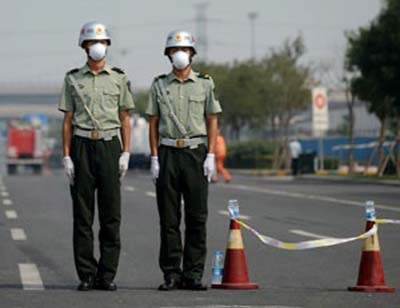
Al Jazeera News, Tianjin :
Rescue personnel battled to clean up hundreds of tons of cyanide at the site of huge explosions in northern China on Monday, as state-run media lambasted officials over their response to the blasts which killed 114.
The August 12 explosions at the hazardous goods storage facility in the port of Tianjin set off a giant fireball, devastated a vast area and raised fears over the impact of toxic pollutants.
The company operating the site had been storing hundreds of tonnes of cyanide, reportedly nearly 30 times the allowed amount, and while officials have insisted that the air and water in the city is safe, residents and victims’ relatives have voiced scepticism.
“Around 700 tons” of sodium cyanide was being stored at the warehouse where the blasts took place, He Shusheng, a Tianjin vice mayor, told a news conference. The Beijing News, citing storage plans it had seen, said the warehouse was only authorised to hold 24 tons of the substance.
A huge, “very complicated and difficult” clean-up was underway on Monday, said He, made harder by the presence of 16 500 empty shipping containers and amid fears forecast rain could release hydrogen cyanide gas.
Authorities had built up sand and earth barriers around the blasts’ 0.1 square kilometre “core area” to prevent any leakage of cyanide or other pollutants, said He. The closest water test point to the blast site revealed cyanide 27.4 times standards on Sunday, officials said without specifying the quantity, but not beyond the cordoned-off area. Sodium cyanide had been found as far as around one kilometre from the blast site.
Military chemical and nuclear experts have been brought in, as have experts from producers of sodium cyanide, exposure to which can be “rapidly fatal”, according to the US Centres for Disease Control.
Environmental campaign group Greenpeace said on Sunday it had tested surface water for cyanide at four locations in the wider city and had not detected high levels of the chemical.
Officials said Monday the death toll from the disaster had risen to 114 with 70 people missing, but cautioned that some of those could among the 60 corpses yet to be identified.
Authorities have faced criticism over failing to uphold regulations surrounding the site’s operation, notably requirements that warehouses stocking dangerous materials be at least one kilometre from surrounding public buildings and main roads. Chinese media reports on Monday said the son of a former police chief of Tianjin port was a major shareholder in the company operating the site, Rui Hai International Logistics.
The reports in web portal Sohu and the Beijing News illustrate the oft-criticised links between business and official elites in China, which have raised concerns that firms with strong government ties face lax enforcement of regulations.
Rescue personnel battled to clean up hundreds of tons of cyanide at the site of huge explosions in northern China on Monday, as state-run media lambasted officials over their response to the blasts which killed 114.
The August 12 explosions at the hazardous goods storage facility in the port of Tianjin set off a giant fireball, devastated a vast area and raised fears over the impact of toxic pollutants.
The company operating the site had been storing hundreds of tonnes of cyanide, reportedly nearly 30 times the allowed amount, and while officials have insisted that the air and water in the city is safe, residents and victims’ relatives have voiced scepticism.
“Around 700 tons” of sodium cyanide was being stored at the warehouse where the blasts took place, He Shusheng, a Tianjin vice mayor, told a news conference. The Beijing News, citing storage plans it had seen, said the warehouse was only authorised to hold 24 tons of the substance.
A huge, “very complicated and difficult” clean-up was underway on Monday, said He, made harder by the presence of 16 500 empty shipping containers and amid fears forecast rain could release hydrogen cyanide gas.
Authorities had built up sand and earth barriers around the blasts’ 0.1 square kilometre “core area” to prevent any leakage of cyanide or other pollutants, said He. The closest water test point to the blast site revealed cyanide 27.4 times standards on Sunday, officials said without specifying the quantity, but not beyond the cordoned-off area. Sodium cyanide had been found as far as around one kilometre from the blast site.
Military chemical and nuclear experts have been brought in, as have experts from producers of sodium cyanide, exposure to which can be “rapidly fatal”, according to the US Centres for Disease Control.
Environmental campaign group Greenpeace said on Sunday it had tested surface water for cyanide at four locations in the wider city and had not detected high levels of the chemical.
Officials said Monday the death toll from the disaster had risen to 114 with 70 people missing, but cautioned that some of those could among the 60 corpses yet to be identified.
Authorities have faced criticism over failing to uphold regulations surrounding the site’s operation, notably requirements that warehouses stocking dangerous materials be at least one kilometre from surrounding public buildings and main roads. Chinese media reports on Monday said the son of a former police chief of Tianjin port was a major shareholder in the company operating the site, Rui Hai International Logistics.
The reports in web portal Sohu and the Beijing News illustrate the oft-criticised links between business and official elites in China, which have raised concerns that firms with strong government ties face lax enforcement of regulations.

